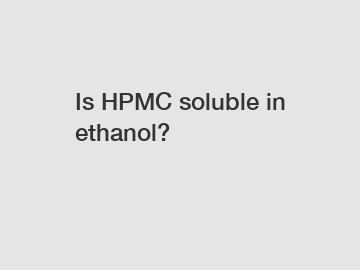Is HPMC soluble in ethanol?
Is HPMC Soluble in Ethanol?
Hydroxypropyl methylcellulose (HPMC) is a versatile polymer used in various industries, including pharmaceuticals, food, and cosmetics. One common question that arises is whether HPMC is soluble in ethanol. In this article, we will explore the solubility of HPMC in ethanol and its implications for different applications.
HPMC: A Brief Overview.

HPMC is a semi-synthetic, water-soluble polymer derived from cellulose. It is widely used as a thickener, stabilizer, binder, and film-former in a variety of products. HPMC is known for its versatility, biocompatibility, and non-toxicity, making it a popular choice in pharmaceutical formulations, food products, and personal care items.
Solubility of HPMC.
HPMC is insoluble in organic solvents such as ethanol. The presence of hydroxypropyl and methyl groups in HPMC molecules gives it a hydrophilic nature, meaning it has an affinity for water. As a result, HPMC readily dissolves in water, forming a viscous solution. However, when it comes into contact with organic solvents like ethanol, HPMC does not dissolve. Instead, it tends to swell and form a gel-like structure.
Implications for Pharmaceutical Industry.
In the pharmaceutical industry, HPMC is commonly used as a thickening agent in oral dosage forms such as tablets and capsules. Its solubility in water is a key factor in achieving the desired drug release profile. When formulating with ethanol as a solvent, it is important to consider the limited solubility of HPMC. This can affect the uniform distribution of the polymer in the formulation and may lead to changes in drug release kinetics.
In such cases, formulation scientists may need to use a combination of solvents or co-solvents to improve the solubility of HPMC in ethanol. Alternatively, they may consider using other polymers that are more compatible with organic solvents. Understanding the solubility of HPMC in ethanol is crucial for optimizing drug formulations and ensuring the desired therapeutic effect.
Implications for Food and Cosmetic Industries.
In the food and cosmetic industries, HPMC is used as a thickener, stabilizer, and emulsifier in various products. While water is the preferred solvent for HPMC in these applications, there may be instances where ethanol is used as a solvent or co-solvent. In such cases, the limited solubility of HPMC in ethanol should be taken into account.
Formulators may need to experiment with different ratios of HPMC to ethanol to achieve the desired viscosity and texture in food and cosmetic products. It is important to note that excessive use of ethanol may lead to the formation of gels or aggregates, affecting the overall quality of the product. By understanding the solubility characteristics of HPMC, formulators can make informed decisions to optimize product performance.
Conclusion.
In conclusion, HPMC is not soluble in ethanol due to its hydrophilic nature. This has implications for various industries, including pharmaceuticals, food, and cosmetics. Understanding the solubility of HPMC in ethanol is essential for formulators to optimize product formulations and ensure the desired outcomes. By exploring alternative solvents or co-solvents, formulators can overcome the limitations of HPMC solubility in ethanol and achieve successful product development.
For more information on HPMC solubility and its applications, feel free to contact us.
For more information, please visit MATECEL hpmc, HPMC for gypsum plaster, pva powder suppliers.
74
0
0


Comments
All Comments (0)